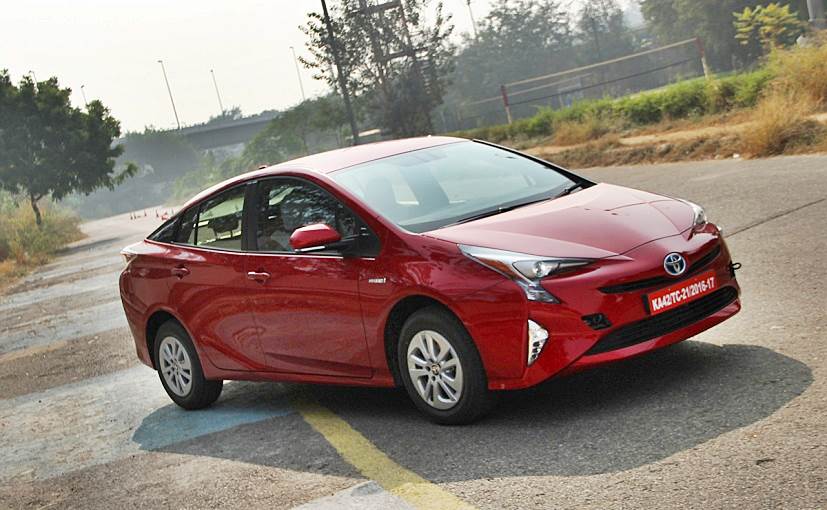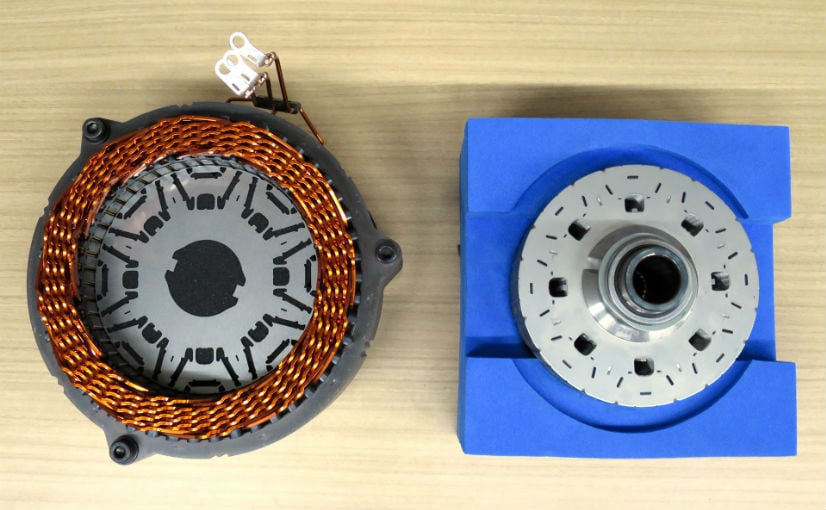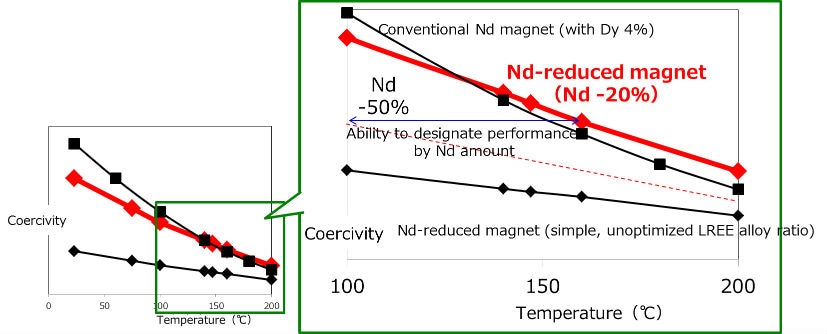Toyota's New Motor Magnets Cut Dependence On Rare-Earth Materials For EVs

- World's first neodymium-reduced, heat-resistant magnet developed
- Toyota's new magnets are cheaper, while maintaining the same coercivity
- The new magnets will be a key elements in the future to popularise EVs
Toyota Motor Corporation has announced that it has developed an electric vehicle motor magnet, which reduces the use of a rare-earth material neodymium by almost 50 per cent. Neodymium magnets are heat-resistant magnets used in high-output electric motors for electric vehicles, as well as machines and robots. With the use of EVs set to increase rapidly in the future, Toyota's new heat-resistant magnet has been designed to survive similar high temperature conditions. It will reduce the dependency on neodymium that will get harder to source in the years to come as its largest supplier, China, toughens its environmental regulations.
Toyota explains that rare-earth materials make up nearly 30 per cent of the elements in magnets used for electric vehicles. A majority of this includes neodymium, which helps magnets withstand high temperatures. Replacing neodymium, Toyota's new magnet uses lanthanum (La) and cerium (Ce), which are low-cost rare earth materials that are not only cheaper to source, but in more abundance as well. In addition, Toyota's new magnet also negates the use of dysprosium and terbium, two additional rare-earth elements that have been used in heat-resistant magnets for EVs.

(Neodymium magnets used on the 4th Generation Toyota Prius)
While such a replacement would normally degrade the magnets' performance, especially under high temperatures, Toyota has adopted new technologies that include a two-layered magnet structure to ensure the new magnets retain their magnetism and heat resistance features, as good as the neodymium ones.
The Japanese auto giant says that the plan is to commercialize the components for power steering motors by the first half of the 2020s, while the magnets will be used for electric vehicles within a decade. The automaker is exploring technologies to mass produce the magnet and is in talks with magnet makers to commercialise the parts. The new magnets will not only be relatively cheaper, but will also help reduce the dependency on China which is said to produce 80 per cent of the world's neodymium.

(Toyota's magnets retains similar coercivity levels as neodymium magnets)
Interestingly though, Toyota isn't the only car maker concerned about the shortage of rare-earth materials. Honda has already been using a hybrid neodymium magnet, developed in collaboration with Daido Steel, which eliminates the need of dysprosium and terbium in the magnet. Honda already uses its hybrid magnets on several international models including the Freed, Jazz and Vezel.
Latest News
 Jaiveer Mehra | Jan 29, 2026Tesla Model S, Model X Production To End By Mid-2026Company CEO Elon Musk made the announcement during the company’s Q4 2025 earnings call.3 mins read
Jaiveer Mehra | Jan 29, 2026Tesla Model S, Model X Production To End By Mid-2026Company CEO Elon Musk made the announcement during the company’s Q4 2025 earnings call.3 mins read car&bike Team | Jan 29, 2026Mahindra Vision S SUV Interior Spied For The First TimeTest mules of the boxy SUV were initially spotted on public roads in mid 2025, with the concept debuting in August.1 min read
car&bike Team | Jan 29, 2026Mahindra Vision S SUV Interior Spied For The First TimeTest mules of the boxy SUV were initially spotted on public roads in mid 2025, with the concept debuting in August.1 min read car&bike Team | Jan 29, 2026Hyundai Exter Facelift Spied Testing Ahead Of India DebutUpdated Exter is expected to make its debut later in the year as Hyundai will look to better compete with the Punch.1 min read
car&bike Team | Jan 29, 2026Hyundai Exter Facelift Spied Testing Ahead Of India DebutUpdated Exter is expected to make its debut later in the year as Hyundai will look to better compete with the Punch.1 min read Janak Sorap | Jan 29, 20262023 World Superbike Championship-winning Ducati Panigale V4 R: Photo GalleryThis one is not tribute bike or a factory replica, but the very machine ridden by Álvaro Bautista during his record-breaking WorldSBK title in the 2023 season.1 min read
Janak Sorap | Jan 29, 20262023 World Superbike Championship-winning Ducati Panigale V4 R: Photo GalleryThis one is not tribute bike or a factory replica, but the very machine ridden by Álvaro Bautista during his record-breaking WorldSBK title in the 2023 season.1 min read car&bike Team | Jan 29, 2026Skoda Kylaq Crosses 50,000 Units Production MilestoneThe sub-compact SUV has played a major role in Skoda’s 107 per cent sales growth in 2025.2 mins read
car&bike Team | Jan 29, 2026Skoda Kylaq Crosses 50,000 Units Production MilestoneThe sub-compact SUV has played a major role in Skoda’s 107 per cent sales growth in 2025.2 mins read Janak Sorap | Jan 29, 2026KTM 390 Adventure R Launched in India at Rs. 3.78 LakhKTM has quietly expanded its adventure lineup in India with the launch of the more off-road-focused 390 Adventure R.1 min read
Janak Sorap | Jan 29, 2026KTM 390 Adventure R Launched in India at Rs. 3.78 LakhKTM has quietly expanded its adventure lineup in India with the launch of the more off-road-focused 390 Adventure R.1 min read
 Bilal Firfiray | Jan 21, 2026Tata Punch Facelift Review: New Turbo Engine; Same Old SoulWith the update, the Tata Punch facelift retains its character of being a healthy runabout, which is perfect for Indian roads. But have these changes made it any better?7 mins read
Bilal Firfiray | Jan 21, 2026Tata Punch Facelift Review: New Turbo Engine; Same Old SoulWith the update, the Tata Punch facelift retains its character of being a healthy runabout, which is perfect for Indian roads. But have these changes made it any better?7 mins read Amaan Ahmed | Jan 17, 2026Bajaj Chetak C25 First Ride Review: Basic, Likeable E-Scooter For First-Time RidersThe Chetak C25, in quite a few ways, is poles apart from the larger and more powerful 30 and 35 Series models, but in its mannerisms, it is very much a Chetak.8 mins read
Amaan Ahmed | Jan 17, 2026Bajaj Chetak C25 First Ride Review: Basic, Likeable E-Scooter For First-Time RidersThe Chetak C25, in quite a few ways, is poles apart from the larger and more powerful 30 and 35 Series models, but in its mannerisms, it is very much a Chetak.8 mins read Bilal Firfiray | Jan 9, 2026Toyota Urban Cruiser Hyryder: 10,000 km Long-Term ReviewAfter spending over three months and 10,000 km with the Toyota Urban Cruiser Hyryder Hybrid, we were impressed by its real-world mileage, seamless hybrid, practical comfort, and Toyota reliability. Is it the best C-SUV then?5 mins read
Bilal Firfiray | Jan 9, 2026Toyota Urban Cruiser Hyryder: 10,000 km Long-Term ReviewAfter spending over three months and 10,000 km with the Toyota Urban Cruiser Hyryder Hybrid, we were impressed by its real-world mileage, seamless hybrid, practical comfort, and Toyota reliability. Is it the best C-SUV then?5 mins read Seshan Vijayraghvan | Jan 8, 20262026 Mahindra XUV 7XO Review: Big On Tech, Bigger On ComfortThe new Mahindra XUV 7XO is flashier, feature packed, and comes with more advanced tech. But are the changes just incremental or actually substantial?1 min read
Seshan Vijayraghvan | Jan 8, 20262026 Mahindra XUV 7XO Review: Big On Tech, Bigger On ComfortThe new Mahindra XUV 7XO is flashier, feature packed, and comes with more advanced tech. But are the changes just incremental or actually substantial?1 min read Preetam Bora | Jan 10, 2026Simple One Gen 2 First Ride Review: 265 km Claimed Range!The Gen 2 model of Simple Energy’s first electric scooter gets a fair few updates, including new features, tech, more range and lighter weight. We spent a couple of hours with the Simple One Gen 2 to find out if it manages to impress.6 mins read
Preetam Bora | Jan 10, 2026Simple One Gen 2 First Ride Review: 265 km Claimed Range!The Gen 2 model of Simple Energy’s first electric scooter gets a fair few updates, including new features, tech, more range and lighter weight. We spent a couple of hours with the Simple One Gen 2 to find out if it manages to impress.6 mins read

































































































































